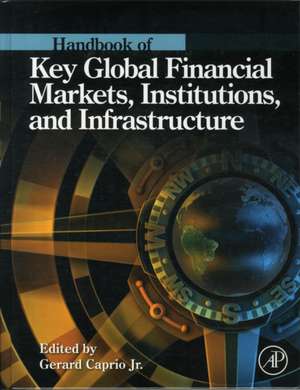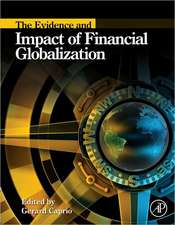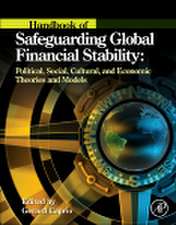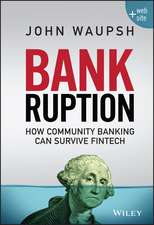Handbook of Key Global Financial Markets, Institutions, and Infrastructure
Gerard Caprioen Limba Engleză Hardback – 13 dec 2012
- Substantial articles by top scholars sets this volume apart from other information sources
- Diverse international perspectives result in new opportunities for analysis and research
- Rapidly developing subjects will interest readers well into the future
Preț: 827.20 lei
Preț vechi: 1185.99 lei
-30% Nou
Puncte Express: 1241
Preț estimativ în valută:
158.33€ • 172.04$ • 133.09£
158.33€ • 172.04$ • 133.09£
Carte tipărită la comandă
Livrare economică 14-28 aprilie
Preluare comenzi: 021 569.72.76
Specificații
ISBN-13: 9780123978738
ISBN-10: 0123978734
Pagini: 634
Dimensiuni: 216 x 276 x 36 mm
Greutate: 1.81 kg
Editura: ELSEVIER SCIENCE
ISBN-10: 0123978734
Pagini: 634
Dimensiuni: 216 x 276 x 36 mm
Greutate: 1.81 kg
Editura: ELSEVIER SCIENCE
Public țintă
Undergraduates and graduate students worldwide working in all areas of finance and economics. Researchers will typically be examining the global aspects and implications of their particular interests.Cuprins
Globalization of Finance: An Historical View (27 articles)
Key Markets, Institutions, and Infrastructure in Global Finance (31 articles)
Key Markets, Institutions, and Infrastructure in Global Finance (31 articles)
Recenzii
"Part of a three-volume series dedicated to examining the myriad issues related to financial globalization…this volume addresses the historical and institutional roots of financial globalization and current key institutional elements of current global finance." --Reference and Research Book News, February 2013
"In times of turmoil, people seek understanding and composure by looking to the past for guidance. This collection of papers provides an excellent reference in our troubled financial times for investors, analysts, and policy makers. As the first comprehensive attempt to document the world’s monetary past, the volume makes a terrific supplement for courses in financial history." --Richard Steckel, The Ohio State University
"The Handbook of Key Global Financial Markets, Institutions, and Infrastructure takes a sweeping view of the history of financial markets and their institutions, which span millennia and includes the rise of fall of empires, republics, and economic and political unions. The volume clearly establishes that many of the recent experiences in financial markets, especially financial crisis, bank internationalisation and government bailouts are not unique to the recent past but have occurred time and time again. The authors of this collection offer rare insights and perspectives on these experiences. Although, the contexts may differ the lessons from history are succinctly explained and interpreted in the modern context. Hopefully the retelling will ensure they are not ignored." --Jonathan A. Batten, Hong Kong University of Science & Technology
"In times of turmoil, people seek understanding and composure by looking to the past for guidance. This collection of papers provides an excellent reference in our troubled financial times for investors, analysts, and policy makers. As the first comprehensive attempt to document the world’s monetary past, the volume makes a terrific supplement for courses in financial history." --Richard Steckel, The Ohio State University
"The Handbook of Key Global Financial Markets, Institutions, and Infrastructure takes a sweeping view of the history of financial markets and their institutions, which span millennia and includes the rise of fall of empires, republics, and economic and political unions. The volume clearly establishes that many of the recent experiences in financial markets, especially financial crisis, bank internationalisation and government bailouts are not unique to the recent past but have occurred time and time again. The authors of this collection offer rare insights and perspectives on these experiences. Although, the contexts may differ the lessons from history are succinctly explained and interpreted in the modern context. Hopefully the retelling will ensure they are not ignored." --Jonathan A. Batten, Hong Kong University of Science & Technology















